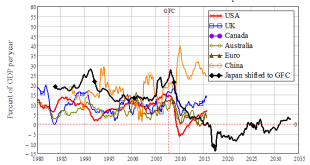I began another post critical of Joe Stiglitz’s analysis with the caveat that I like Joe. I’ll add to that that I respect his intellect too, both because he’s very bright—you don’t win a Nobel Prize (even in Economics!) without being very bright—and because compared to some other winners, he is very capable of thinking beyond the limitations of the mainstream. But there are some mainstream concepts that are so deeply embedded in even highly intelligent, flexible thinkers like Joe, that they...
Read More »Our Dysfunctional Monetary System
The great tragedy of the global economic malaise is that it is caused by a shortage of something that is essentially costless to produce: money. Click here to read the rest of this post.
Read More »For Kingston “Becoming An Economist” students
I’m posting videos of lectures given by my Kingston colleagues to the introductory “Becoming an Economist” course, since the StudySpace software Kingston uses doesn’t support MP4 files. The first is Devrim Yilmaz’s lecture last week on “Data Collection and Presentation”. http://www.debtdeflation.com/blogs/wp-content/uploads/2016/01/Devrim.mp4
Read More »My Kingston Inaugural Lecture with slides and data
I’ve been Head of School at Kingston University London for over 18 months now, but these things do take time: last Wednesday I gave my inaugural Professorial lecture to an audience of about 200 people. My screen-recording video of the talk is below. Click here to download the Powerpoint slides; Minsky crisis model; Minsky Loanable Funds model; Minsky Endogenous Money model; Private Debt levels (6 countries); Private Credit growth (6 countries); USA Private Debt change & Unemployment;...
Read More »Note To Joe Stiglitz: Banks Originate, Not Intermediate, And That’s Why Aggregate Demand Is Stuffed
I like Joe Stiglitz, both professionally and personally. His Globalization and its Discontents was virtually the only work by a Nobel Laureate economist that I cited favourably in my Debunking Economics, because he had the courage to challenge the professional orthodoxy on the “Washington Consensus”. Far more than most in the economics mainstream—like Ken Rogoff for example—Joe is capable of thinking outside its box. But Joe’s latest public contribution—“The Great Malaise Continues” on...
Read More »The Power And The Impotence Of The ECB
I’ve attended two conferences in two days where both the power and the impotence of the European Central Bank (EBC) have been on vivid display. Its political power is considerable, both in form and in substance. At both seminars, the ECB speaker—ECB Board member Peter Praet at the first, and ECB President Mario Draghi at the second—spoke first, and then left. In form, the ECB has no need to defend its policies because it is unimpeachable in its execution of them. In substance, it does not...
Read More »Lecture05 Why Economists Disagree: The common blindspot on the Environment
The position of the economy in the environment is a shared blindspot in economics: no existing school handles the topic well, and yet this is the key issue we need to understand. I explain the Laws of Thermodynamics–as well as I could in an introductory class without using mathematics–and provide some links to important topics that students wouldn’t normally hear about in an economics degree. [embedded content] Click here for the Powerpoint slides....
Read More »Becoming An Economist Lecture 4: Post Keynesians
This lecture covers the Post Keynesian school of thought in economics, focusing mainly on its modern emphasis upon endogenous money, sectoral balances, and Minsky’s Financial Instability Hypothesis. I also show how to do non-equilibrium modeling (using my Open Source modeling program Minsky of course). [embedded content] Click here to download the Powerpoint slides.
Read More »The Unnatural Rate Of Interest (Ultra-Wonkish)
Paul Krugman’s latest column—“Check Out Our Low, Low (Natural) Rates” (which he didn’t flag as “Wonkish”, even though it is so in spades—noted that the “natural real rate of interest” was falling, and that this justified the low interest rate set by the Federal Reserve. And this made me think about Karl Marx. Click here to read the rest of this post.
Read More »Economists Prove That Capitalism Is Unnecessary
Actually they’ve done no such thing. But they do effectively assume that it’s unnecessary all the time. This transcendental truth became apparent to me in the reactions I have had from mainstream economists to a lecture I gave to my Kingston students this month (which is posted on my YouTube channel and blog). Click here to read the rest of this post.
Read More » Heterodox
Heterodox

